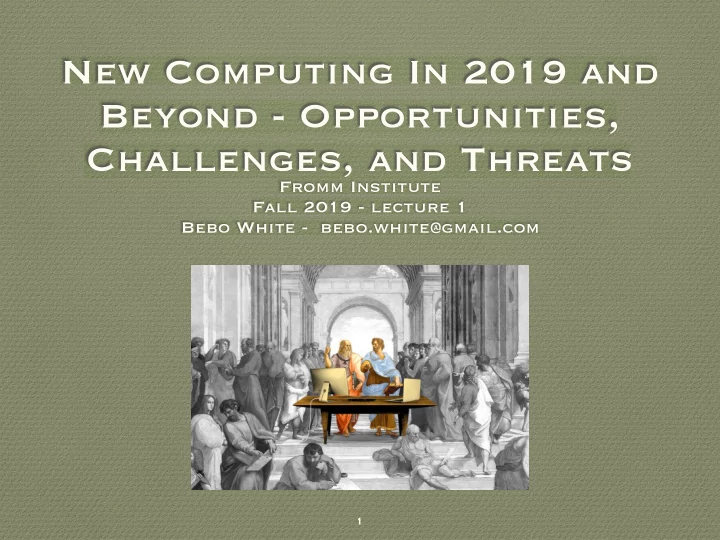

New Computing In 2019 and Beyond - Opportunities, Challenges, and Threats Fromm Institute Fall 2019 - lecture 1 Bebo White - bebo.white@gmail.com 1
calendar 2
administrivia (1/2) • all slides will be available online at each class - http://bit.ly/ 2GK8G9O • slides are subject to change from those posted and those used • all have Creative Commons license (i.e., can be freely shared) • don’t try to write down materials on slides - that’s why they are dense - focus on listening and understanding • feel free to record (if you are that interested ) • questions in the basket or via e-mail; I will share best ones at the next class � 3
administrivia (2/2) • if I get going too fast or too technical, let me know • topics are a “moving target” - will try to keep up with current news and developments • I am happy to provide a reference list or bibliography • will stay around for discussions after class through lunch • I will take periodic breaks for Q&A � 4
goals for this course (1/2) • in general • to give you: • an experience • a whirlwind tour of many different systems of utopian desires, future fantasy, and experimental life • mental exercises and philosophical challenges � 5
goals for this course (2/2) • in particular • to help you to: • appreciate why some of these new computing technologies are unique, revolutionary, and disruptive • have the vocabulary and understanding to evaluate stories that you read/hear • participate knowingly with friends, relatives, colleagues in discussions on these topics � 6
Goals for this course • to help you to • appreciate why some of these new computing technologies are unique, revolutionary, and disruptive • have the vocabulary to analyze stories that you read/hear • do some good mental exercises • but mainly TO HAVE FUN and BE CHALLENGED! � 7
� 8
one interesting view of computer evolution and society � 9
selecting topics - disruption vs.hype (1/2) • technology is a form of social relationship and always evolves • technology begins, develops, persists, mutates, stagnates, and declines • Amara’s Law : “We tend to overestimate the effect of a technology in the short run and underestimate the effect in the long run.” • a disruptive technology/innovation is often different from what may be expected (mutation?) and “changes the landscape;” “who saw that coming?” � 10
� 11
examples • web-based video (e.g., Netflix) • ride-sharing services (e.g., Uber) • cryptocurrency (e.g., Bitcoin) • collaborative commerce (e.g., Airbnb) • 3-D printing • etc., etc. � 12
13
14
squares=foundation; circle=enablers; diamonds=disrupto rs � 15 (source: Deloitte)
selecting topics - disruption vs.hype (2/2) • hype - the promotion of a product or idea intensively, often exaggerating its importance or benefits • how can we separate what is hype and what is genuinely disruptive? � 16
gartner hype cycle � 17
� 18
planned syllabus • Class 1 : The Internet of Things (IOT) • Class 2 : Artificial Intelligence (AI), Machine Learning (ML), and Deep Learning (DL) • Class 3 : Data Science, “Big Data,” and Data Analytics • Class 4 : Blockchain without Cryptocurrency • Class 5 : Computer Interfaces of the Future - beyond the keyboard, screen, and mouse • Class 6 : Robotics • Class 7 : Ubiquitous Systems • Class 8 : Quantum Computing � 19
20
how long have we talked about a connected society? • smart cities, smart homes, smart cars. etc. - the stuff of science fiction • separate items working together with purpose • but we could not figure out how to do it - connectivity, communication, security, data sharing etc. • what technologies would it take? 21
disruption or hype? 22
23
first, what is the internet? • “a worldwide system of computer networks - a network of networks in which users at any one computer can, if they have permission, get information from any other computer” • possible due to a standardized communications protocol - TCP/IP - Transmission Control Protocol/Internet Protocol • WWW is not the Internet, it is an application/program that runs/ operates on the Internet infrastructure • the Internet has a very interesting history that I would recommend researching • it is OK to refer to “the Net” � 24
Types of Networks 25
26
27
objects with some computing element 28
Recommend
More recommend